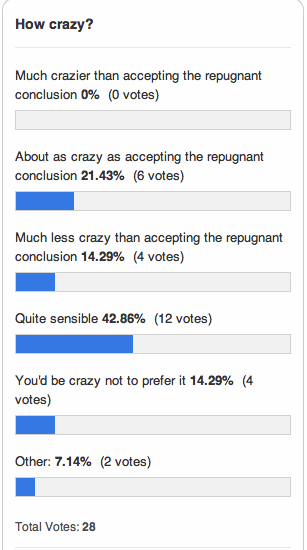“Never, for any reason on earth, could you wish for an increase of pain. Of pain you could wish only one thing: that it should stop. Nothing in the world was so bad as physical pain. In the face of pain there are no heroes, no heroes […]. –George Orwell, 1984 via Brian Tomasik , who seems to agree that just considering pain should be enough to tell you that it’s very important.
It seems quite a few people I know consider pain to have some kind of special status of badness, and that preventing it is thus much more important than I think it. I wouldn’t object, except that they apply this in their ethics, rather than just their preferences regarding themselves. For instance arguing that other people shouldn’t have children, because of the possibility of those children suffering pain. I think pain is less important to most people relative to their other values than such negative utilitarians and similar folk believe.
One such argument for the extreme importance of pain is something like ‘it’s obvious’. When you are in a lot of pain, nothing seems more important than stopping that pain. Hell, even when you are in a small amount of pain, mitigating it seems a high priority. When you are looking at something in extreme pain, nothing seems more important than stopping that pain. So pain is just obviously the most important bad thing there is. The feeling of wanting a boat and not having one just can’t compare to pain. The goodness of lying down at the end of a busy day is nothing next to the badness of even relatively small pains.
I hope I do this argument justice, as I don’t have a proper written example of it at hand.
An immediate counter is that when we are not in pain, or directly looking at things in pain, pain doesn’t seem so important. For instance, though many people in the thralls of a hangover consider it to be pretty bad, they are repeatedly willing to trade half a day of hangover for an evening of drunkenness. ‘Ah’, you may say, ‘that’s just evidence that life is bad – so bad that they are desperate to relieve themselves from the torment of their sober existences! So desperate that they can’t think of tomorrow!’. But people have been known to plan drinking events, and even to be in quite good spirits in anticipation of the whole thing.
It is implicit in the argument from ‘pain seems really bad close up’ that pain does not seem so bad from a distance. How then to know whether your near or far assessment is better?
You could say that up close is more accurate, because everything is more accurate with more detail. Yet since this is a comparison between different values, being up close to one relative to others should actually bias the judgement.
Perhaps up close is more accurate because at a distance we do our best not to think about pain, because it is the worst thing there is.
If you are like many people, when you are eating potato chips, you really want to eat more potato chips. Concern for your health, your figure, your experience of nausea all pale into nothing when faced with your drive to eat more potato chips. We don’t take that as good evidence that really deep down you want to eat a lot of potato chips, and you are just avoiding thinking about it all the rest of the time to stop yourself from going crazy. How is that different?
Are there other reasons to pay special attention to the importance of pain to people who are actually experiencing it?
Added: I think I have a very low pain threshold, and am in a lot of pain far more often than most people. I also have bad panic attacks from time to time, which I consider more unpleasant than any pain I have come across, and milder panic attacks frequently. So it’s not that I don’t know what I’m talking about. I agree that suffering comes with (or consists of) an intense urge to stop the suffering ASAP. I just don’t see that this means that I should submit to those urges the rest of the time. To the contrary! It’s bad enough to devote that much time to such obsessions. When I am not in pain I prefer to work on other goals I have, like writing interesting blog posts, rather than say trying to discover better painkillers. I am not willing to experiment with drugs that could help if I think they might interfere with my productivity in other ways. Is that wrong?


